2024年中考英语总复习 语法专题课件 句子种类(共38张PPT)
文档属性
| 名称 | 2024年中考英语总复习 语法专题课件 句子种类(共38张PPT) | 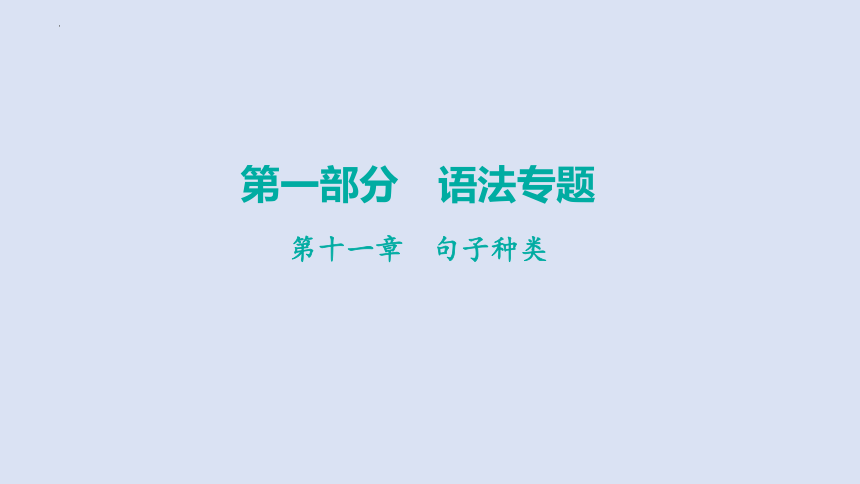 | |
| 格式 | pptx | ||
| 文件大小 | 1.5MB | ||
| 资源类型 | 教案 | ||
| 版本资源 | 通用版 | ||
| 科目 | 英语 | ||
| 更新时间 | 2024-03-18 17:33:49 | ||
图片预览

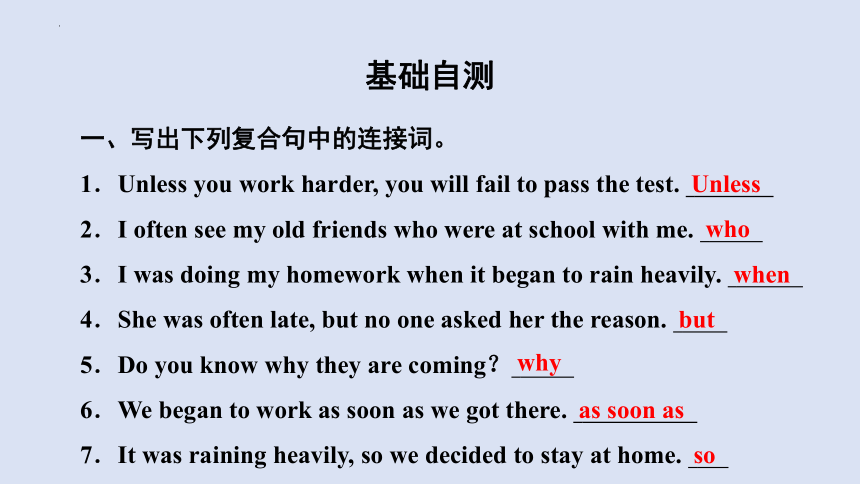
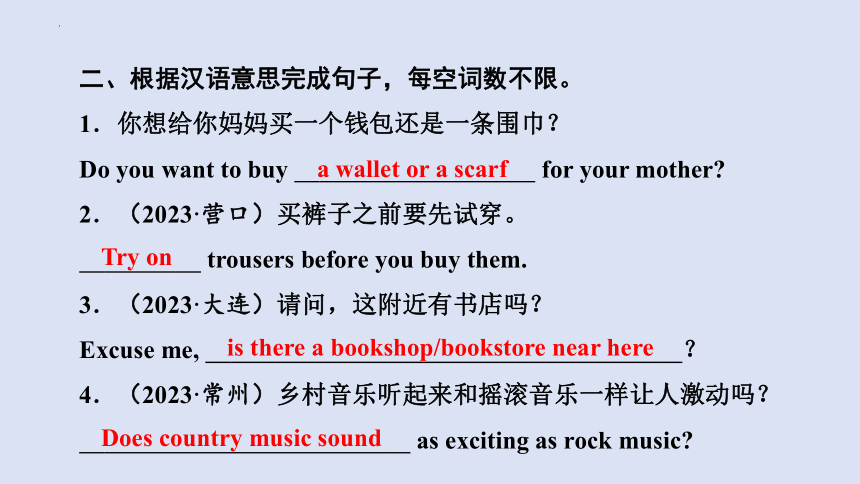
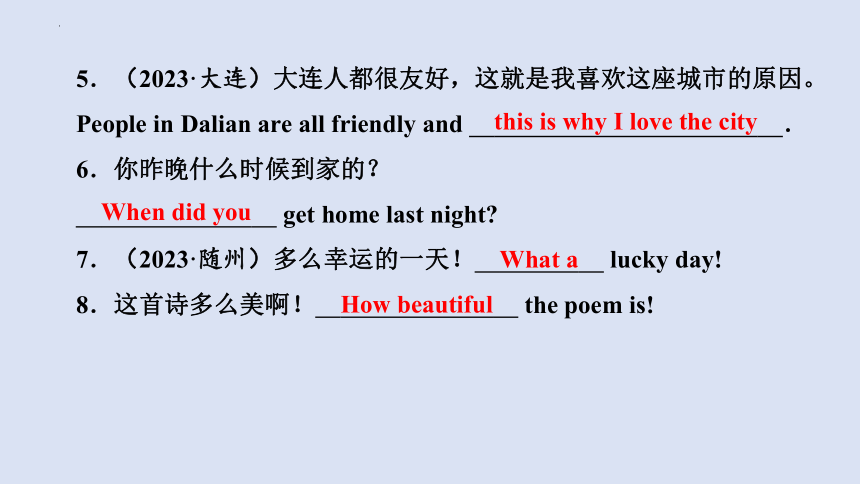
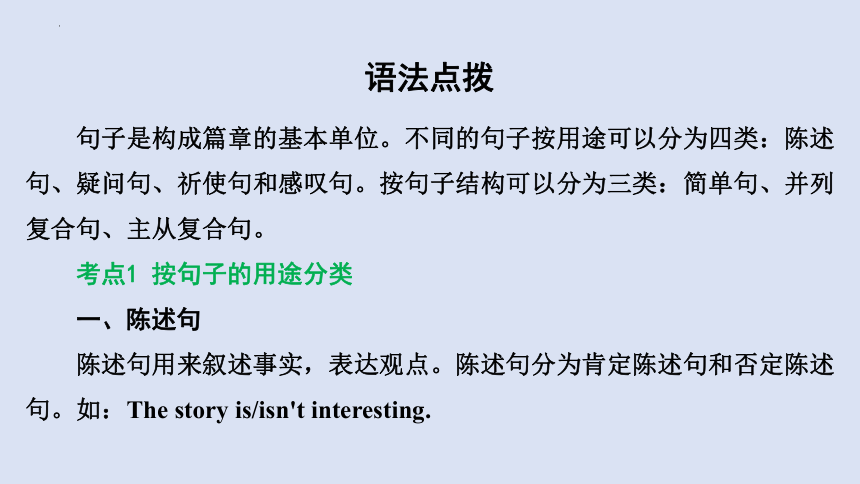
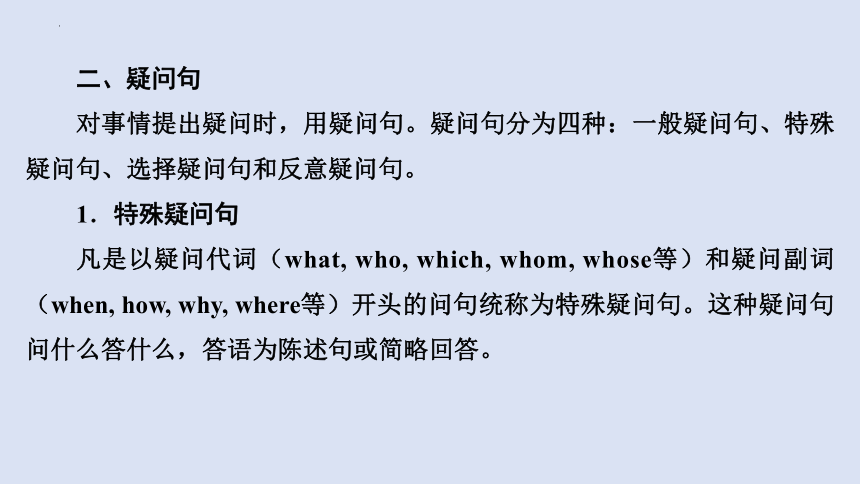
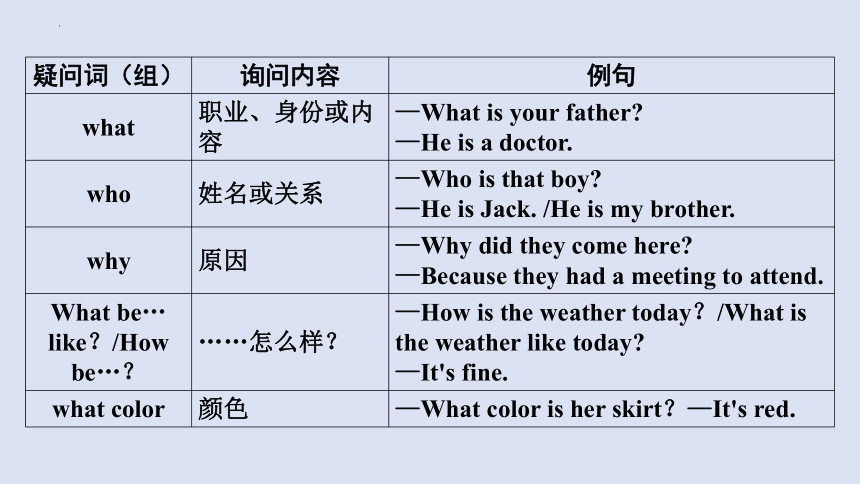
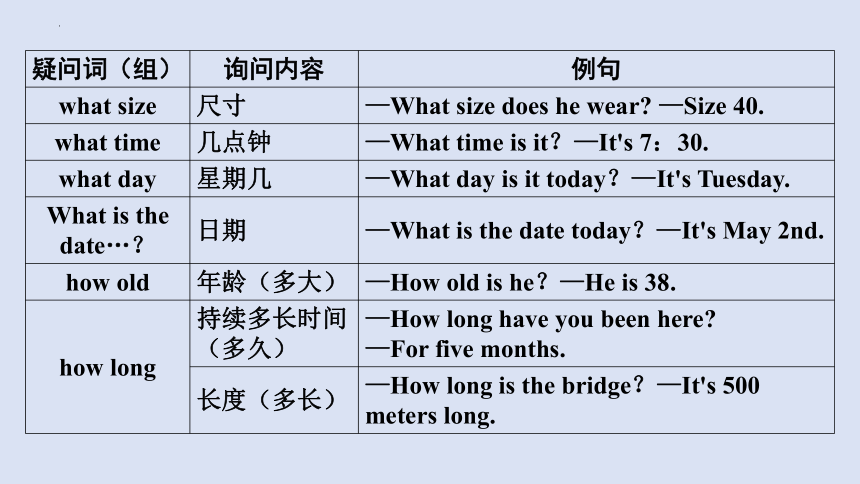
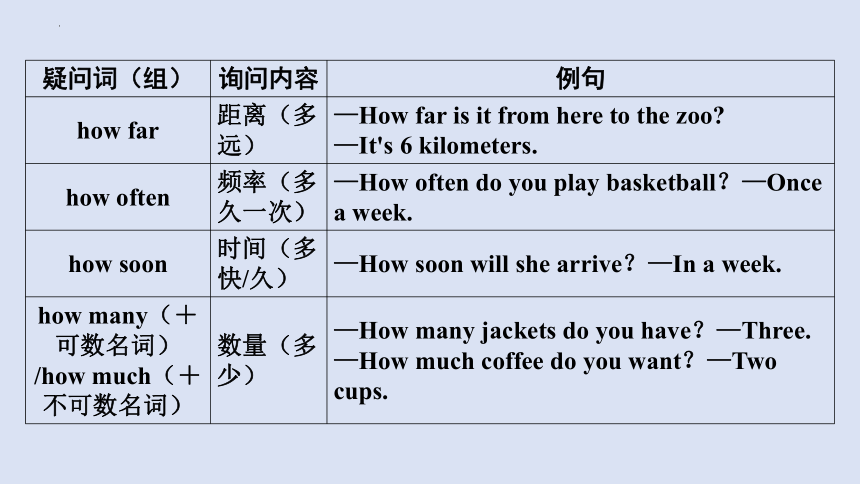
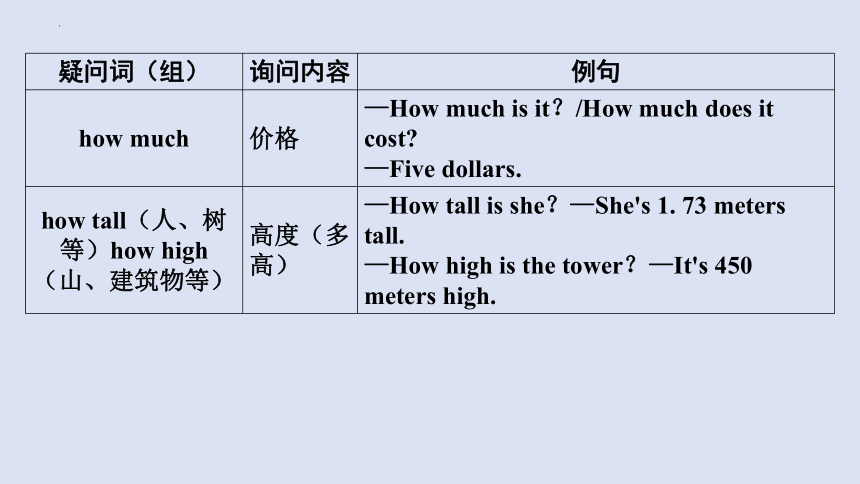
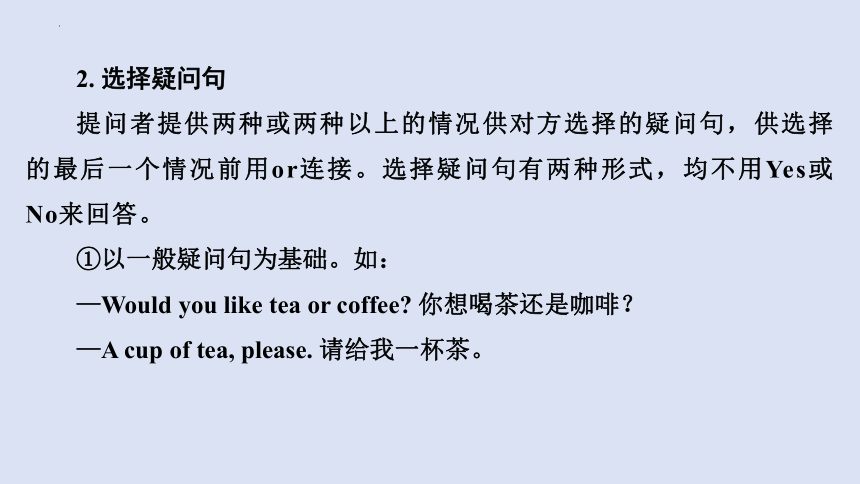
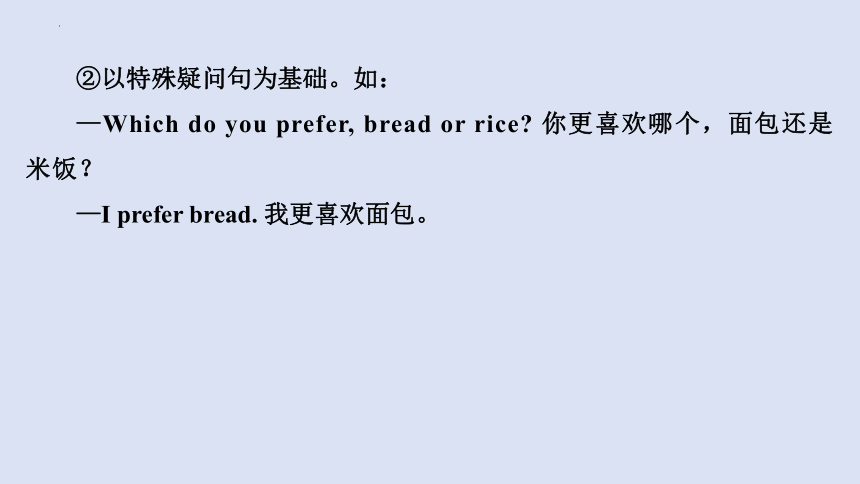
文档简介
(共38张PPT)
第一部分 语法专题
第十一章 句子种类
一、写出下列复合句中的连接词。
1.Unless you work harder, you will fail to pass the test. Unless
2.I often see my old friends who were at school with me. who
3.I was doing my homework when it began to rain heavily. when
4.She was often late, but no one asked her the reason. but
5.Do you know why they are coming? why
6.We began to work as soon as we got there. as soon as
7.It was raining heavily, so we decided to stay at home. so
Unless
who
when
but
why
as soon as
so
基础自测
二、根据汉语意思完成句子,每空词数不限。
1.你想给你妈妈买一个钱包还是一条围巾?
Do you want to buy a wallet or a scarf for your mother
2.(2023·营口)买裤子之前要先试穿。
Try on trousers before you buy them.
3.(2023·大连)请问,这附近有书店吗?
Excuse me, is there a bookshop/bookstore near here ?
4.(2023·常州)乡村音乐听起来和摇滚音乐一样让人激动吗?
Does country music sound as exciting as rock music
a wallet or a scarf
Try on
is there a bookshop/bookstore near here
Does country music sound
5.(2023·大连)大连人都很友好,这就是我喜欢这座城市的原因。
People in Dalian are all friendly and this is why I love the city .
6.你昨晚什么时候到家的?
When did you get home last night
7.(2023·随州)多么幸运的一天! What a lucky day!
8.这首诗多么美啊! How beautiful the poem is!
this is why I love the city
When did you
What a
How beautiful
句子是构成篇章的基本单位。不同的句子按用途可以分为四类:陈述句、疑问句、祈使句和感叹句。按句子结构可以分为三类:简单句、并列复合句、主从复合句。
考点1 按句子的用途分类
一、陈述句
陈述句用来叙述事实,表达观点。陈述句分为肯定陈述句和否定陈述句。如:The story is/isn't interesting.
语法点拨
二、疑问句
对事情提出疑问时,用疑问句。疑问句分为四种:一般疑问句、特殊疑问句、选择疑问句和反意疑问句。
1.特殊疑问句
凡是以疑问代词(what, who, which, whom, whose等)和疑问副词(when, how, why, where等)开头的问句统称为特殊疑问句。这种疑问句问什么答什么,答语为陈述句或简略回答。
疑问词(组) 询问内容 例句
what 职业、身份或内容 —What is your father
—He is a doctor.
who 姓名或关系 —Who is that boy
—He is Jack. /He is my brother.
why 原因 —Why did they come here
—Because they had a meeting to attend.
What be… like?/How be…? ……怎么样? —How is the weather today?/What is the weather like today
—It's fine.
what color 颜色 —What color is her skirt?—It's red.
疑问词(组) 询问内容 例句
what size 尺寸 —What size does he wear —Size 40.
what time 几点钟 —What time is it?—It's 7:30.
what day 星期几 —What day is it today?—It's Tuesday.
What is the date…? 日期 —What is the date today?—It's May 2nd.
how old 年龄(多大) —How old is he?—He is 38.
how long 持续多长时间(多久) —How long have you been here
—For five months.
长度(多长) —How long is the bridge?—It's 500 meters long.
疑问词(组) 询问内容 例句
how far 距离(多远) —How far is it from here to the zoo
—It's 6 kilometers.
how often 频率(多久一次) —How often do you play basketball?—Once a week.
how soon 时间(多快/久) —How soon will she arrive?—In a week.
how many(+可数名词)/how much(+不可数名词) 数量(多少) —How many jackets do you have?—Three.
—How much coffee do you want?—Two cups.
疑问词(组) 询问内容 例句
how much 价格 —How much is it?/How much does it cost
—Five dollars.
how tall(人、树等)how high(山、建筑物等) 高度(多高) —How tall is she?—She's 1. 73 meters tall.
—How high is the tower?—It's 450 meters high.
2. 选择疑问句
提问者提供两种或两种以上的情况供对方选择的疑问句,供选择的最后一个情况前用or连接。选择疑问句有两种形式,均不用Yes或No来回答。
①以一般疑问句为基础。如:
—Would you like tea or coffee 你想喝茶还是咖啡?
—A cup of tea, please. 请给我一杯茶。
②以特殊疑问句为基础。如:
—Which do you prefer, bread or rice 你更喜欢哪个,面包还是米饭?
—I prefer bread. 我更喜欢面包。
3.反意疑问句
可以表示真实的疑问,也可以表示说话者的某种倾向、强调或反问。反意疑问句有前后两个部分:“前肯后否”或“前否后肯”。
①当陈述部分带有little, few, never, hardly, seldom, nobody, nothing, no one, none, neither等否定意义的词时,问句部分用肯定式。如:
He was seldom late, was he
He is hardly able to swim, is he
②当陈述部分所含的否定词是通过加un-, dis-, -less等前、后缀构成时,问句部分依然用否定结构。如:
It is unfair, isn't it
He dislikes English, doesn't he
对点练1
( D )1. (2023·阜新)— does the museum open at weekends
—At 9:00 am.
A.How B.Where C.Why D.When
D
( B )2. (2023·自贡)— do you help at the old people's home
—Once a week. We should care about the old more.
A.How long B.How often C.How soon D.How many
B
( C )3. (2023·长春)—Which season do you like better in Changchun, winter or autumn
— . I like playing with snow.
A.Yes, I do B.No, I don't C.Winter D.Autumn
C
三、感叹句
通常由what, how引导,表示赞美、惊叹、喜悦、愤怒等感情,句末常用感叹号。
What a good boy he is! How good the boy is!
↓ ↓ ↓ ↓ ↓ ↓ ↓ ↓
(感叹词)(名词短语)(主语) (谓语) =(感叹词) (形容词)(主语)(谓语)
四、祈使句
一般用来表示请求、命令、劝说、号召、警告等,通常省略主语(you),谓语动词用原形。其常用结构如下:
特别提醒
(1)以let开头的祈使句,常用于第一、三人称,表示建议、邀请和劝说等。
(2)以“No+名词/动名词”构成的否定祈使句,通常用作公共场所的提示语。如:No photos!禁止拍照! No parking!禁止停车!
对点练2
( D )1. (2023·宿迁)—China won all the gold medals at the 2023 World Table Tennis Championships(锦标赛).
— exciting news!
A.What a B.How a C.How D.What
D
( D )2. (2023·雅安)—Look at Panda Ya Ya! happy she is!
—Yes. There is enough fresh bamboo for her to eat now.
A.What B.What a C.How a D.How
D
( A )3. (2023·长春) less time on the phone at night, or you will find it hard to fall asleep.
A.Spend B.Spending
C.To spend D.Spent
A
巩固训练
Last summer, my father took my brother and me on a cross-country train tour. We were very excited on the first day. But soon, interest disappeared. On the second day, my brother cried, “We're bored! 1 should we do?” My dad replied, “ 2 worry, my dear. I have a good idea. Just 3 a game that I used to play when I was a boy. This game is called Rock, Paper, Scissors. You have never heard about it, 4 ? I am good at playing this game. The rule is simple. ” Then, he showed us how to play the game. We played it happily. I won twice and my brother won more. 5 wonderful day!
( A )1. A. What B.Where C.How
( B )2. A. Do B.Don't C.Not
( C )3. A. playing B.played C.play
( B )4. A. do you B.have you C.haven't you
( B )5. A. What B.What a C.How
A
B
C
B
B
考点2 按句子的结构分类
一、简单句
只有一个主谓结构的句子,各成分全部是由单词或短语构成。主要有以下六类:
①主谓(主语+动词,下同)(SV):The bus is coming.
②主(系)表(SP):Amy is helpful.
③主谓宾(SVO):John opened the door.
④主谓宾宾(SVOO):Grandpa bought me a new dictionary.
⑤主谓宾补(SVOC):Most students have found online learning necessary.
⑥There be句型(存现句):There is a tree behind the shop.
There be句型,也叫存现句,表示“某地(或某时)有某人(或某物)”。其中,be动词要与离它最近的主语保持人称和数的一致。
1.There be句型的句式
There be句型的否定句是在be后加not;变为一般疑问句时,将be放在句首。如:
There aren't two chairs or a desk in the room. (否定句)
—Is there anything wrong with your ears?(一般疑问句)
—Yes, there is. /No, there isn't.
2.There be句型的时态
时态 构成 例句
一般现在时 There is/are… There is a desk in the room.
一般过去时 There was/were… There was a desk in the room in the past.
一般将来时 There will be…/There is/are going to be… There will/is going to be a football match next week.
现在完成时 There have/has been… There have been no letters from my parents since last year.
3. There be+sb. +doing sth. +地点/时间状语:某地/某时有某人正在做某事。 如:
There are several children swimming in the river. 河里有几个孩子正在游泳。
4.There be句型与have的区别:There be句型表示“存在”关系, have表示“所属”关系, 两者不能混用在一个句子中。 如:
There is going to/will be a class meeting tomorrow. 明天有一个班会。
对点练3
( A )1. (2023·甘肃)There a big tree behind the shop. You can see many birds in it.
A.is B.are C.was D.were
( B )2. (2023·四川改编)There a lot of ways to keep healthy. For example, we can do more exercise and eat less junk food.
A.is B.are C.have D.was
A
B
二、并列复合句
由并列连词连接两个或几个简单句组成的句子叫并列复合句。如:Jim is a good boy and he is very clever.
三、主从复合句
含有一个主句和一个或一个以上从句的句子叫主从复合句。主从复合句包括宾语从句、状语从句和定语从句(第十二章、十三章、十四章详细讲解)等。
巩固训练
What do you do when you begin to read an English newspaper
You'd better know how many sections(专栏) there 1 . Usually there 2 news, business, science, lifestyle, sports, and cartoons. Choose your favorite part 3 then you can read it carefully.
( B )1. A. is B.are C.were
( A )2. A. is B.was C.are
( C )3. A. but B.or C.and
B
A
C
句子的种类在语法选择中的考查
首先要分析句子结构,看是简单句还是复合句。简单句根据具体类型的结构和用法进行选择,复合句的选择可参考后面三个语法专题。
(2023·广东35题)Everything was magical. excited David was!
A.How B.What C.What an
解析:句意:大卫多么激动啊!感叹句中心词是形容词“excited”,用how引导。故选A。
对接中考
一、语法选择(2023·牡丹江改编)
There was a little boy living in a city with his parents. Every summer holiday, the parents would take their son to visit his grandparents. And the boy loved to stay with them. 1 did his grandparents live They lived far away in another city.
Year by year, the boy grew up. One day, he said to his parents, “Now, I am big enough. This holiday, I can go to my grandparents' house alone. Please let me go by 2 .”
( B )1. A. How B.Where C.Why
( C )2. A. me B.my C.myself
B
C
强化训练
The parents said yes, but they were worried about him. So they taught him everything he needed 3 to travel alone.
The day came when the boy was to leave 4 his grandparents' house. His parents came to the train station to see him off. While waiting, the boy's father handed him a letter and said, “Son, 5 this letter and read it when you feel afraid on the way, and you will calm down. ”
( B )3. A. knowing B.to know C.knows
( A )4. A. for B.about C.at
( B )5. A. opens B.open C.opening
根据and后的read可知这里是并列祈使句,故用动词原形。
B
A
B
The train began to move. 6 excited the boy was! There 7 a big man on the train sitting next to the boy. The boy was a little scared. What should he do Suddenly the boy 8 his father's letter. He opened the letter, “Don't be afraid. I am here with you on this train. ” Just after reading the letter, all his fear was gone. 9 magical letter!
( C )6. A. What an B.What a C.How
( B )7. A. is B.was C.were
事情发生在过去,用there be的一般过去时,又因空后的“a big man”是单数名词,故用was。
C
B
( B )8. A. remembers B.remembered C.will remember
( B )9. A. How B.What a C.What
B
B
In fact, life is like that. 10 we do something alone, we needn't be sad or afraid. There are always some people with us on the journey, like our parents and friends. Just do whatever we want and remember we are actually not alone.
( A )10. A. When B.Since C.Unless
句意:……我们独自做某件事,我们没有必要伤心或者害怕。结合选项,When符合题意。
短文大意:本文主要讲述了一个男孩在暑假时独自去看望爷爷奶奶的经历。
A
二、短文填空(2023·温州改编)
for how problem she avoid invite because and what love give be
Tina is a thirteen year old middle school student. Last year, she went to a summer school in France and stayed with a local family, the Truffauts.
At first, things didn't go well 1. because she couldn't speak French. Simple things like finding the right bus stop became big 2. problems . The Truffauts helped her a lot and treated her like part of the family. Tina was helpful as well. 3. She did some housework with the family every day. On the weekend, she joined a community club and there 4. were many activities. For most of the time, she used body language to communicate. People showed their thanks with smiles 5. and she would always smile back.
because
problems
She
were
and
for how problem she avoid invite because and what love give be
Language was not a problem 6. for her any more. As a new member of the club, Tina was 7. invited to have parties with the other members. Day by day, she made more friends. Tina began to 8. love her new life. You can clearly see 9. how proud she was of the experience.
Smiling and 10. giving a helping hand can always make people closer than a language can.
for
invited
love
how
giving
6.根据“Language was not a problem”可知此处表示语言对她来说不是问题了,应该用介词for来表示“对……而言”。
7.此处表示“Tina被邀请”应该用一般过去时的被动语态,故填过去分词invited。
9.此处用how感叹中心词proud。
短文大意:本文主要讲述了蒂娜如何在法国适应她的新生活。
第一部分 语法专题
第十一章 句子种类
一、写出下列复合句中的连接词。
1.Unless you work harder, you will fail to pass the test. Unless
2.I often see my old friends who were at school with me. who
3.I was doing my homework when it began to rain heavily. when
4.She was often late, but no one asked her the reason. but
5.Do you know why they are coming? why
6.We began to work as soon as we got there. as soon as
7.It was raining heavily, so we decided to stay at home. so
Unless
who
when
but
why
as soon as
so
基础自测
二、根据汉语意思完成句子,每空词数不限。
1.你想给你妈妈买一个钱包还是一条围巾?
Do you want to buy a wallet or a scarf for your mother
2.(2023·营口)买裤子之前要先试穿。
Try on trousers before you buy them.
3.(2023·大连)请问,这附近有书店吗?
Excuse me, is there a bookshop/bookstore near here ?
4.(2023·常州)乡村音乐听起来和摇滚音乐一样让人激动吗?
Does country music sound as exciting as rock music
a wallet or a scarf
Try on
is there a bookshop/bookstore near here
Does country music sound
5.(2023·大连)大连人都很友好,这就是我喜欢这座城市的原因。
People in Dalian are all friendly and this is why I love the city .
6.你昨晚什么时候到家的?
When did you get home last night
7.(2023·随州)多么幸运的一天! What a lucky day!
8.这首诗多么美啊! How beautiful the poem is!
this is why I love the city
When did you
What a
How beautiful
句子是构成篇章的基本单位。不同的句子按用途可以分为四类:陈述句、疑问句、祈使句和感叹句。按句子结构可以分为三类:简单句、并列复合句、主从复合句。
考点1 按句子的用途分类
一、陈述句
陈述句用来叙述事实,表达观点。陈述句分为肯定陈述句和否定陈述句。如:The story is/isn't interesting.
语法点拨
二、疑问句
对事情提出疑问时,用疑问句。疑问句分为四种:一般疑问句、特殊疑问句、选择疑问句和反意疑问句。
1.特殊疑问句
凡是以疑问代词(what, who, which, whom, whose等)和疑问副词(when, how, why, where等)开头的问句统称为特殊疑问句。这种疑问句问什么答什么,答语为陈述句或简略回答。
疑问词(组) 询问内容 例句
what 职业、身份或内容 —What is your father
—He is a doctor.
who 姓名或关系 —Who is that boy
—He is Jack. /He is my brother.
why 原因 —Why did they come here
—Because they had a meeting to attend.
What be… like?/How be…? ……怎么样? —How is the weather today?/What is the weather like today
—It's fine.
what color 颜色 —What color is her skirt?—It's red.
疑问词(组) 询问内容 例句
what size 尺寸 —What size does he wear —Size 40.
what time 几点钟 —What time is it?—It's 7:30.
what day 星期几 —What day is it today?—It's Tuesday.
What is the date…? 日期 —What is the date today?—It's May 2nd.
how old 年龄(多大) —How old is he?—He is 38.
how long 持续多长时间(多久) —How long have you been here
—For five months.
长度(多长) —How long is the bridge?—It's 500 meters long.
疑问词(组) 询问内容 例句
how far 距离(多远) —How far is it from here to the zoo
—It's 6 kilometers.
how often 频率(多久一次) —How often do you play basketball?—Once a week.
how soon 时间(多快/久) —How soon will she arrive?—In a week.
how many(+可数名词)/how much(+不可数名词) 数量(多少) —How many jackets do you have?—Three.
—How much coffee do you want?—Two cups.
疑问词(组) 询问内容 例句
how much 价格 —How much is it?/How much does it cost
—Five dollars.
how tall(人、树等)how high(山、建筑物等) 高度(多高) —How tall is she?—She's 1. 73 meters tall.
—How high is the tower?—It's 450 meters high.
2. 选择疑问句
提问者提供两种或两种以上的情况供对方选择的疑问句,供选择的最后一个情况前用or连接。选择疑问句有两种形式,均不用Yes或No来回答。
①以一般疑问句为基础。如:
—Would you like tea or coffee 你想喝茶还是咖啡?
—A cup of tea, please. 请给我一杯茶。
②以特殊疑问句为基础。如:
—Which do you prefer, bread or rice 你更喜欢哪个,面包还是米饭?
—I prefer bread. 我更喜欢面包。
3.反意疑问句
可以表示真实的疑问,也可以表示说话者的某种倾向、强调或反问。反意疑问句有前后两个部分:“前肯后否”或“前否后肯”。
①当陈述部分带有little, few, never, hardly, seldom, nobody, nothing, no one, none, neither等否定意义的词时,问句部分用肯定式。如:
He was seldom late, was he
He is hardly able to swim, is he
②当陈述部分所含的否定词是通过加un-, dis-, -less等前、后缀构成时,问句部分依然用否定结构。如:
It is unfair, isn't it
He dislikes English, doesn't he
对点练1
( D )1. (2023·阜新)— does the museum open at weekends
—At 9:00 am.
A.How B.Where C.Why D.When
D
( B )2. (2023·自贡)— do you help at the old people's home
—Once a week. We should care about the old more.
A.How long B.How often C.How soon D.How many
B
( C )3. (2023·长春)—Which season do you like better in Changchun, winter or autumn
— . I like playing with snow.
A.Yes, I do B.No, I don't C.Winter D.Autumn
C
三、感叹句
通常由what, how引导,表示赞美、惊叹、喜悦、愤怒等感情,句末常用感叹号。
What a good boy he is! How good the boy is!
↓ ↓ ↓ ↓ ↓ ↓ ↓ ↓
(感叹词)(名词短语)(主语) (谓语) =(感叹词) (形容词)(主语)(谓语)
四、祈使句
一般用来表示请求、命令、劝说、号召、警告等,通常省略主语(you),谓语动词用原形。其常用结构如下:
特别提醒
(1)以let开头的祈使句,常用于第一、三人称,表示建议、邀请和劝说等。
(2)以“No+名词/动名词”构成的否定祈使句,通常用作公共场所的提示语。如:No photos!禁止拍照! No parking!禁止停车!
对点练2
( D )1. (2023·宿迁)—China won all the gold medals at the 2023 World Table Tennis Championships(锦标赛).
— exciting news!
A.What a B.How a C.How D.What
D
( D )2. (2023·雅安)—Look at Panda Ya Ya! happy she is!
—Yes. There is enough fresh bamboo for her to eat now.
A.What B.What a C.How a D.How
D
( A )3. (2023·长春) less time on the phone at night, or you will find it hard to fall asleep.
A.Spend B.Spending
C.To spend D.Spent
A
巩固训练
Last summer, my father took my brother and me on a cross-country train tour. We were very excited on the first day. But soon, interest disappeared. On the second day, my brother cried, “We're bored! 1 should we do?” My dad replied, “ 2 worry, my dear. I have a good idea. Just 3 a game that I used to play when I was a boy. This game is called Rock, Paper, Scissors. You have never heard about it, 4 ? I am good at playing this game. The rule is simple. ” Then, he showed us how to play the game. We played it happily. I won twice and my brother won more. 5 wonderful day!
( A )1. A. What B.Where C.How
( B )2. A. Do B.Don't C.Not
( C )3. A. playing B.played C.play
( B )4. A. do you B.have you C.haven't you
( B )5. A. What B.What a C.How
A
B
C
B
B
考点2 按句子的结构分类
一、简单句
只有一个主谓结构的句子,各成分全部是由单词或短语构成。主要有以下六类:
①主谓(主语+动词,下同)(SV):The bus is coming.
②主(系)表(SP):Amy is helpful.
③主谓宾(SVO):John opened the door.
④主谓宾宾(SVOO):Grandpa bought me a new dictionary.
⑤主谓宾补(SVOC):Most students have found online learning necessary.
⑥There be句型(存现句):There is a tree behind the shop.
There be句型,也叫存现句,表示“某地(或某时)有某人(或某物)”。其中,be动词要与离它最近的主语保持人称和数的一致。
1.There be句型的句式
There be句型的否定句是在be后加not;变为一般疑问句时,将be放在句首。如:
There aren't two chairs or a desk in the room. (否定句)
—Is there anything wrong with your ears?(一般疑问句)
—Yes, there is. /No, there isn't.
2.There be句型的时态
时态 构成 例句
一般现在时 There is/are… There is a desk in the room.
一般过去时 There was/were… There was a desk in the room in the past.
一般将来时 There will be…/There is/are going to be… There will/is going to be a football match next week.
现在完成时 There have/has been… There have been no letters from my parents since last year.
3. There be+sb. +doing sth. +地点/时间状语:某地/某时有某人正在做某事。 如:
There are several children swimming in the river. 河里有几个孩子正在游泳。
4.There be句型与have的区别:There be句型表示“存在”关系, have表示“所属”关系, 两者不能混用在一个句子中。 如:
There is going to/will be a class meeting tomorrow. 明天有一个班会。
对点练3
( A )1. (2023·甘肃)There a big tree behind the shop. You can see many birds in it.
A.is B.are C.was D.were
( B )2. (2023·四川改编)There a lot of ways to keep healthy. For example, we can do more exercise and eat less junk food.
A.is B.are C.have D.was
A
B
二、并列复合句
由并列连词连接两个或几个简单句组成的句子叫并列复合句。如:Jim is a good boy and he is very clever.
三、主从复合句
含有一个主句和一个或一个以上从句的句子叫主从复合句。主从复合句包括宾语从句、状语从句和定语从句(第十二章、十三章、十四章详细讲解)等。
巩固训练
What do you do when you begin to read an English newspaper
You'd better know how many sections(专栏) there 1 . Usually there 2 news, business, science, lifestyle, sports, and cartoons. Choose your favorite part 3 then you can read it carefully.
( B )1. A. is B.are C.were
( A )2. A. is B.was C.are
( C )3. A. but B.or C.and
B
A
C
句子的种类在语法选择中的考查
首先要分析句子结构,看是简单句还是复合句。简单句根据具体类型的结构和用法进行选择,复合句的选择可参考后面三个语法专题。
(2023·广东35题)Everything was magical. excited David was!
A.How B.What C.What an
解析:句意:大卫多么激动啊!感叹句中心词是形容词“excited”,用how引导。故选A。
对接中考
一、语法选择(2023·牡丹江改编)
There was a little boy living in a city with his parents. Every summer holiday, the parents would take their son to visit his grandparents. And the boy loved to stay with them. 1 did his grandparents live They lived far away in another city.
Year by year, the boy grew up. One day, he said to his parents, “Now, I am big enough. This holiday, I can go to my grandparents' house alone. Please let me go by 2 .”
( B )1. A. How B.Where C.Why
( C )2. A. me B.my C.myself
B
C
强化训练
The parents said yes, but they were worried about him. So they taught him everything he needed 3 to travel alone.
The day came when the boy was to leave 4 his grandparents' house. His parents came to the train station to see him off. While waiting, the boy's father handed him a letter and said, “Son, 5 this letter and read it when you feel afraid on the way, and you will calm down. ”
( B )3. A. knowing B.to know C.knows
( A )4. A. for B.about C.at
( B )5. A. opens B.open C.opening
根据and后的read可知这里是并列祈使句,故用动词原形。
B
A
B
The train began to move. 6 excited the boy was! There 7 a big man on the train sitting next to the boy. The boy was a little scared. What should he do Suddenly the boy 8 his father's letter. He opened the letter, “Don't be afraid. I am here with you on this train. ” Just after reading the letter, all his fear was gone. 9 magical letter!
( C )6. A. What an B.What a C.How
( B )7. A. is B.was C.were
事情发生在过去,用there be的一般过去时,又因空后的“a big man”是单数名词,故用was。
C
B
( B )8. A. remembers B.remembered C.will remember
( B )9. A. How B.What a C.What
B
B
In fact, life is like that. 10 we do something alone, we needn't be sad or afraid. There are always some people with us on the journey, like our parents and friends. Just do whatever we want and remember we are actually not alone.
( A )10. A. When B.Since C.Unless
句意:……我们独自做某件事,我们没有必要伤心或者害怕。结合选项,When符合题意。
短文大意:本文主要讲述了一个男孩在暑假时独自去看望爷爷奶奶的经历。
A
二、短文填空(2023·温州改编)
for how problem she avoid invite because and what love give be
Tina is a thirteen year old middle school student. Last year, she went to a summer school in France and stayed with a local family, the Truffauts.
At first, things didn't go well 1. because she couldn't speak French. Simple things like finding the right bus stop became big 2. problems . The Truffauts helped her a lot and treated her like part of the family. Tina was helpful as well. 3. She did some housework with the family every day. On the weekend, she joined a community club and there 4. were many activities. For most of the time, she used body language to communicate. People showed their thanks with smiles 5. and she would always smile back.
because
problems
She
were
and
for how problem she avoid invite because and what love give be
Language was not a problem 6. for her any more. As a new member of the club, Tina was 7. invited to have parties with the other members. Day by day, she made more friends. Tina began to 8. love her new life. You can clearly see 9. how proud she was of the experience.
Smiling and 10. giving a helping hand can always make people closer than a language can.
for
invited
love
how
giving
6.根据“Language was not a problem”可知此处表示语言对她来说不是问题了,应该用介词for来表示“对……而言”。
7.此处表示“Tina被邀请”应该用一般过去时的被动语态,故填过去分词invited。
9.此处用how感叹中心词proud。
短文大意:本文主要讲述了蒂娜如何在法国适应她的新生活。
同课章节目录
- 词法
- 名词
- 动词和动词短语
- 动词语态
- 动词时态
- 助动词和情态动词
- 非谓语动词
- 冠词
- 代词
- 数词和量词
- 形容词副词及其比较等级
- 介词和介词短语
- 连词和感叹词
- 构词法
- 相似、相近词比较
- 句法
- 陈述句
- 一般疑问句和否定疑问句
- 特殊疑问句及选择疑问句
- 反意疑问句
- 存在句(There be句型)
- 宾语从句
- 定语从句
- 状语从句
- 主谓一致问题
- 简单句
- 并列句
- 复合句
- 主谓一致
- 主、表语从句
- 名词性从句
- 直接引语和间接引语
- 虚拟语气
- 感叹句
- 强调句
- 倒装句
- 祈使句
- 句子的成分
- 句子的分类
- 题型专区
- 单项选择部分
- 易错题
- 完形填空
- 阅读理解
- 词汇练习
- 听说训练
- 句型转换
- 补全对话
- 短文改错
- 翻译
- 书面表达
- 任务型阅读
- 语法填空
- 其他资料
